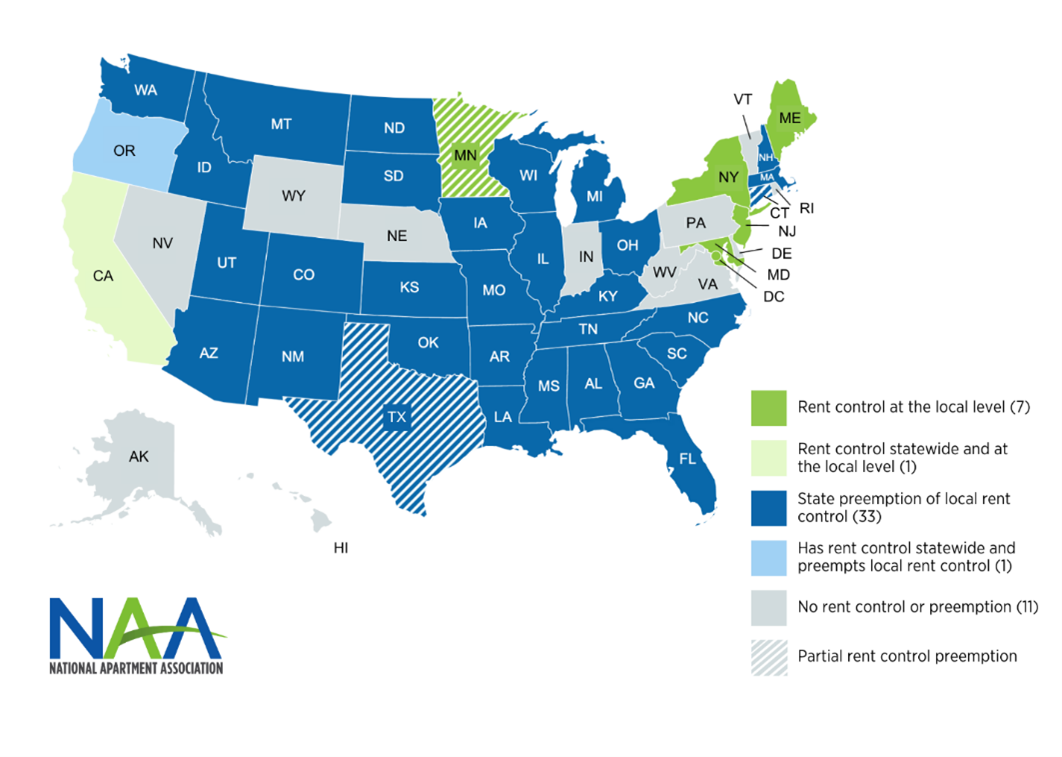The National Apartment Association (NAA) is tracking over 200 rent control bills across the country, 72 of which have been filed in the first quarter of 2024. NAA’s tracking includes bills that implement or expand rent control policies as well as those that allow local governments to adopt these disastrous policies. Legislative proposals in 2024 include not only states where regulating the multifamily industry is commonplace like California or New Jersey, but also newcomers to the issue like Georgia, New Hampshire and Wisconsin.
Rent control policies, also now commonly referred to as rent regulation, rent stabilization or anti-price gouging policies, artificially limit the rents and rent increases that a housing provider can charge their residents in rental communities. These policies decouple rents from housing providers’ actual costs or market forces. While six states and D.C. have statewide rent or local rent control in place, the vast majority of states preempt, or prohibit, the adoption of rent control laws.
While rent control terminology may have slight nuances to fit the political aims of proponents, all of them distort the rental housing market and make rental housing less available and less affordable in the long run (confirmed by a recent literature review of the growing body of rent control research). According to research commissioned by NAA, over 70% of housing providers say that rent control impacts their investment and development plans; actions include reducing investments, shifting plans to other markets and canceling plans altogether. Learn more about rent control.
A few current bills can serve as examples of the current legislative battle:
- Washington HB 2114 would have implemented an annual rent increase cap of seven percent statewide, a complete reversal from the current prohibition on rent control in the Evergreen State. This bill passed the Washington House of Representatives by a margin of 54 to 43, though successful advocacy from the Washington Multi-Family Housing Association ensured it stalled in a Senate committee. Despite this victory this year, key proponents of the industry in the legislature are not expected to keep their seats in the next session, making defending against this policy much more difficult in the future.
- Colorado HB 24-1259 would limit rent increases to higher of the previous year’s increase or 10 percent for two years following a declared disaster. This would create a loophole to the state’s current rent control preemption and has, at the time of writing, passed the Colorado House of Representatives.
- Pennsylvania SB 1095 would implement a rent control regime limiting annual increases to 10 percent or the percent increase in the relevant county’s Area Median Income, whichever is greater. Pennsylvania does not explicitly prohibit municipal government from adopting rent control, but no rent regulations currently exist in the state. This bill was introduced in the Pennsylvania Senate on March 11.
- A California ballot initiative will decide whether the state’s rent control policy becomes more strict this November. California restricts rental operators from increasing annual rent higher than the lower of five percent plus the inflation rate, or 10 percent. Local governments are allowed to pass even greater caps on rent, but state law exempts certain properties from being regulated, including single-family homes and units built after February 1, 1995. Advocates are pushing to repeal these exemptions during the November election.
While it is important to remain vigilant and support the industry’s advocacy in opposition to rent control at all levels of government, the political makeup of each jurisdiction makes some of these bills much more credible threats to the industry than others. The possibility of rent control being adopted is heavily dependent on the status of preemption in the state, or whether the state already has a rent control regime in place. To make it easier to understand the full policy landscape across the country, NAA is delivering its rent control threat assessment. To learn more, contact Ben Harrold, Manager of Public Policy.
NAA's assessment has identified the following as the top ten states to watch in 2024:
- California
- Colorado
- Connecticut
- Hawaii
- Illinois
- Massachusetts
- Michigan
- Nevada
- Pennsylvania
- Washington

2023 Review
In 2023, NAA tracked 196 rent control-related bills in state governments around the country. Of those, the vast majority were aimed at adopting, allowing or strengthening rent control in some way. These mostly came from the places you would expect like California, New York and the District of Columbia. Nearly every state saw action in this arena, though.
With varying degrees of success, lawmakers across the country introduced legislation that would control rent. On July 6, 2023, the Oregon governor signed a law that will restrict rent increases to an annual maximum of ten percent in addition to the existing limit of seven percent plus the inflation rate. Maine and Maryland both passed laws that establish lengthy notice periods for rent increases.
Local lawmakers were even more aggressive in their push for rent control with new policies adopted by cities in California, Maryland, Maine, New York and countless more officials seriously discussing the idea.
Only 13 of our tracked bills repealed, prohibited or weakened rent control at the state level. Some of the notable rental industry wins include Montana’s rent control prohibition or Florida’s Live Local Act, which preempted rent control and allocated billions of dollars to affordable housing production initiatives.
Last year the Florida Apartment Association secured a massive win for the industry in the form of a rent control preemption and billions for affordable housing programs. Before that, the Columbus and Ohio Apartment Associations led their coalition to victory in the form of a preemption in the Buckeye State. These, combined with last year’s preemption in Montana, demonstrate that the rental housing industry is prepared to keep this issue from city council chambers.
NAA's Action
Across the country, NAA and our state and local partners are sounding the alarm and steadfastly working to protect the industry against the growing risk of rent control. The Maryland Multi-Housing Association and Apartment and Office Building Association of Metropolitan Washington have been beating back a torrent of bad legislative proposals throughout Maryland. Most recently, an aggressive rent limitation was killed in Howard County.
Similarly, the Massachusetts Apartment Association and the Greater Boston Real Estate Board have ensured that advocates’ push for rent stabilization has not only come up to a vote in the legislature but hasn’t been put on the ballot in November. The perennial debate revolves around lifting Massachusetts' ban on rent control which would almost certainly lead to new laws being adopted in Boston, Cambridge and Somerville, among others.
The Chicagoland Apartment Association is on the forefront of industry advocacy through a coalition known as Supporting Housing Affordability, Progress and Equality (SHAPE Illinois). This group has beaten back many proposals to institute rent control in Chicago and Illinois. Recently, they utilized NAA grant funding for a public education campaign and the creation of an advocacy video warning of the dangers of rent control.
NAA’s state and local affiliate partners are working tirelessly to beat back rent control in legislative sessions, with strong support from NAA and its Housing Affordability Grant Program. However, there is still work to do. NAA is working in lockstep with our affiliates in priority states to ensure that recent rent control bills do not move any further. For those places where a ballot initiative is on the table, we are working with affiliate leadership to educate the public on the destructive nature of capping rents.
Building upon NAA’s affiliate support, NAA has engaged in a new partnership with national, real estate trade associations, such as the National Multifamily Housing Council and Mortgage Bankers Association: the Housing Solutions Coalition. By recognizing that rent control is a detriment to the entire housing market, the coalition is prepared to fight its adoption and instead, urge passage or responsible and sustainable pro-housing policies.
At the federal level, the Biden Administration continues to explore housing policy changes aligning with the White House Blueprint for a Renters Bill of Rights. NAA continues its federal advocacy efforts to impress upon the Administration (including the Federal Housing Finance Agency which is considering forward-facing rent control on enterprise-backed properties to prevent “egregious rent increases”) the disastrous impacts of rent control. Because of NAA’s affiliate partners and members, over 3000 industry letters were sent to FHFA as part of its public comment process, urging them to recognize that federalizing tenant protections is incredibly problematic for the rental housing industry and adoption of the rent control would encourage housing providers to refinance away from federal loan programs.
For more information about rent control, please contact Ben Harrold, Manager of Public Policy.
